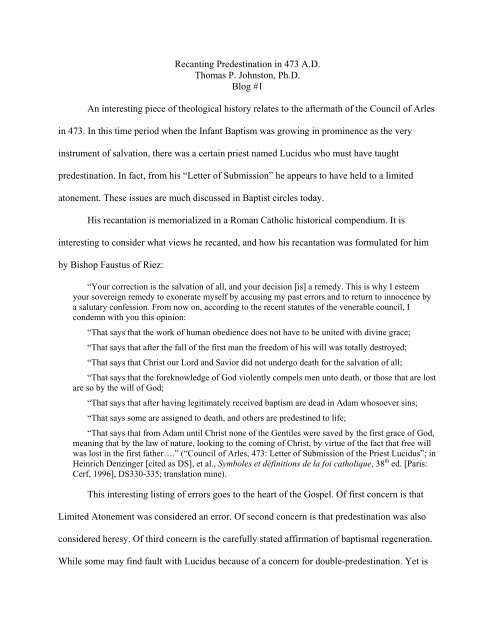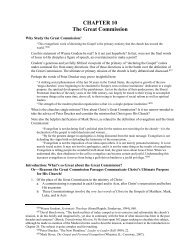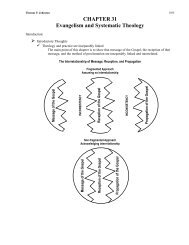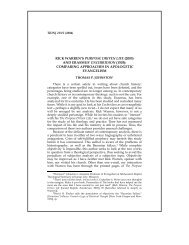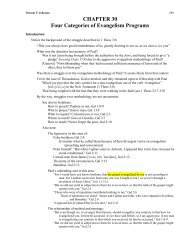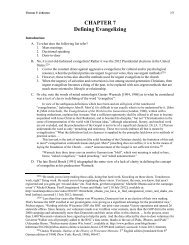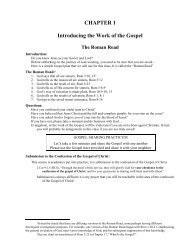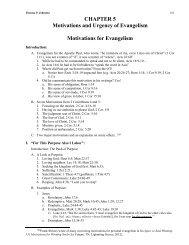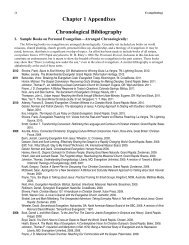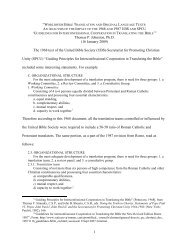Lucidus Recants Predestination and Particular Atonement
Lucidus Recants Predestination and Particular Atonement
Lucidus Recants Predestination and Particular Atonement
Create successful ePaper yourself
Turn your PDF publications into a flip-book with our unique Google optimized e-Paper software.
Recanting <strong>Predestination</strong> in 473 A.D.<br />
Thomas P. Johnston, Ph.D.<br />
Blog #1<br />
An interesting piece of theological history relates to the aftermath of the Council of Arles<br />
in 473. In this time period when the Infant Baptism was growing in prominence as the very<br />
instrument of salvation, there was a certain priest named <strong>Lucidus</strong> who must have taught<br />
predestination. In fact, from his “Letter of Submission” he appears to have held to a limited<br />
atonement. These issues are much discussed in Baptist circles today.<br />
His recantation is memorialized in a Roman Catholic historical compendium. It is<br />
interesting to consider what views he recanted, <strong>and</strong> how his recantation was formulated for him<br />
by Bishop Faustus of Riez:<br />
“Your correction is the salvation of all, <strong>and</strong> your decision [is] a remedy. This is why I esteem<br />
your sovereign remedy to exonerate myself by accusing my past errors <strong>and</strong> to return to innocence by<br />
a salutary confession. From now on, according to the recent statutes of the venerable council, I<br />
condemn with you this opinion:<br />
“That says that the work of human obedience does not have to be united with divine grace;<br />
“That says that after the fall of the first man the freedom of his will was totally destroyed;<br />
“That says that Christ our Lord <strong>and</strong> Savior did not undergo death for the salvation of all;<br />
“That says that the foreknowledge of God violently compels men unto death, or those that are lost<br />
are so by the will of God;<br />
“That says that after having legitimately received baptism are dead in Adam whosoever sins;<br />
“That says some are assigned to death, <strong>and</strong> others are predestined to life;<br />
“That says that from Adam until Christ none of the Gentiles were saved by the first grace of God,<br />
meaning that by the law of nature, looking to the coming of Christ, by virtue of the fact that free will<br />
was lost in the first father….” (“Council of Arles, 473: Letter of Submission of the Priest <strong>Lucidus</strong>”; in<br />
Heinrich Denzinger [cited as DS], et al., Symboles et définitions de la foi catholique, 38 th ed. [Paris:<br />
Cerf, 1996], DS330-335; translation mine).<br />
This interesting listing of errors goes to the heart of the Gospel. Of first concern is that<br />
Limited <strong>Atonement</strong> was considered an error. Of second concern is that predestination was also<br />
considered heresy. Of third concern is the carefully stated affirmation of baptismal regeneration.<br />
While some may find fault with <strong>Lucidus</strong> because of a concern for double-predestination. Yet is
not this argument commonly wielded against the conception of predestination in the first place<br />
(Eph 1:3-12).<br />
As evangelists, we are bound to evangelize all men, baptized as infants or not, <strong>and</strong> trust<br />
that they can respond by their free will when the Holy Spirit works through the instrument of the<br />
Word of God preached (Rom 10:17). Further, believing in that the way is narrow (Matt 7:12-13)<br />
<strong>and</strong> that only some will be saved (1 Cor 9:22), we must leave the results of our evangelizing to<br />
the sovereign will of God, <strong>and</strong> not generalize God’s salvation at the baptismal font of infants—<br />
infants who have not responded <strong>and</strong> can they yet respond to the proclamation of the Gospel.


